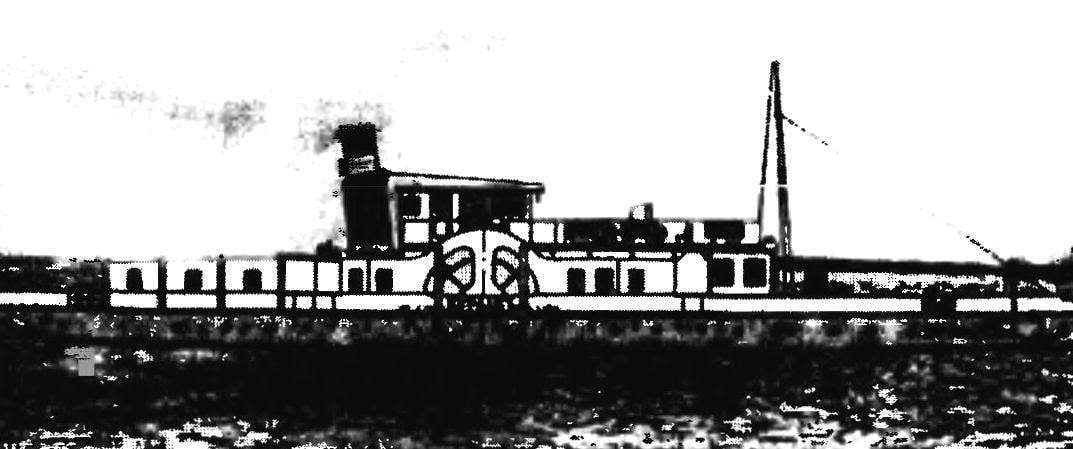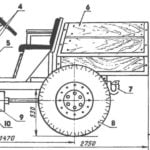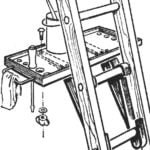 Chassis model paddle steamer. Model river paddle steamer look so advantageous as compared with the model of a modern airliner, as a large-scale replica of a steam locomotive railway locomotive attractive copies of our days. A water suspension model “Kolesnik” the nineteenth century, looks amazing – plenty of add-ons “mast, pipe, efficient things – all this creates a mouthwatering flavor century couple.
Chassis model paddle steamer. Model river paddle steamer look so advantageous as compared with the model of a modern airliner, as a large-scale replica of a steam locomotive railway locomotive attractive copies of our days. A water suspension model “Kolesnik” the nineteenth century, looks amazing – plenty of add-ons “mast, pipe, efficient things – all this creates a mouthwatering flavor century couple.
We offer our model ship model paddle steamer “BURLAK” – like cargo-passenger ships in the late nineteenth century, it was widespread in the Siberian rivers. The length of the ship was 48 m, width – 8.25 m and sludge with a full load. 1.25 m Paddle wheels, driven in rotation by a steam engine capacity of 120 hp, provided the steamer speed of about 10 miles per hour.
the hull was gathering of rectangular frames with rounded bilge parts. At the rear of the chassis located steering wheel, consisting of a wooden pen, enshrined in forged steel frame. By crinoline feather was attached a chain Sorlin.
In the bow of the vessel was manually set anchor-mooring spire that was used for sample victor sheymov (anchor chain) and mooring lines. Admiralty type Anchors with steel rods were attached to the boat for sea – on the hoists with davit and gakami. There, in front of a spire, it was fixed bollard designed for towing vessel. Mooring bollards placed two on each side – in the nose and aft.

The theoretical drawing of the steamship “BURLAK”

The power plant of the ship model:
1 – the electric motor ME-30; 2 – Mount the gear (bolt with nut M5); 3 – gear housing (duralumin sheet s4); 4 – Mount the gear cover (M5 screw with nut); 5 – Primary gear reducer; 6 – a first stage gear; 7 – a gear wheel of the second stage; 8 – the intermediate shaft; 9,17 – sleeve-intermediate shaft bearing (bronze); 10 – the gear cover (duralumin sheet s4); 11.16 – sleeve-bearing propeller shaft (bronze); 12 – propeller shaft (steel); 13,15 – spacers (steel); 14 – a gear wheel of the second stage
Propulsor ship served as paddle wheels partially submerged in water. Each of the wheels consisted of the hub, the spokes and rings – were fixed between the last eight wooden paddles. At the level of the deck paddle wheel is enclosed in a run-out; on top of the wheel closed metal housings board. Casings installed Over the flying bridge. In the run-out and constructed premises.
In the central part of the ship, between the paddle wheels were the engine room, and behind it the boiler casing.
Passenger cabin of the first and second classes located on the deck. In front of the ship above the cabins, the promenade deck has been arranged; along the guard rail on it were benches, three on each side. To exit to the promenade deck designed two stairs. Shturvalnom cabin located in the central part of the vessel.
For the aft cabin was a tiller drive bay, closed on top of the wooden bars; shturtrosy drive have been conducted into the wheelhouse through ducts along the right and left sides.
Produce a model ship “Burlak” is not too difficult. Recommended scale of 1:50, and the length of the “Kolesnik” will be 960 mm – this is quite enough for the running of the model (with or without radio control), and for the bench.
Almost all body parts and add-ons can be made of birch plywood with a thickness of 3 mm to 5 mm. From 3 mm plywood are cut and the propeller wheels, paddles cut from beech slats, well hubs are machined from a birch. Assembling all the veneer elements being on the epoxy adhesive; and stripping after polymerization prepared assembly units are covered by parquet lacquer.
The finished body is glued deck, made integrally with the run-out of plywood 4 mm thick. The deck should be provided by the superstructure notches (through which access is provided to the power plant model and radio equipment) as well as under the paddle wheels. Housings paddle wheels are cut from sheet aluminum of 0.5 mm thickness.
On the deck of the model are fixed fore and aft mooring bollards, anchor device and anchor-mooring spire. Behind a steering cabin installed chimney – it is best to solder chassis Tinplate thickness of 0.3 mm. From the same material can be made base ventilation vents and air intakes for them – because matching the diameter of the plastic balls from children’s toys.


Goods-passenger paddle steamer “BURLAK”:
1 – flagpole; 2 – aft cabins; 3 – towing arch; 4 – transition ramp; 5 – towing hook; 6 – chimney; 7 – steam whistle; 8 shturvalnom cutting; 9 – paddle wheel housing; 10 – a lifeline; 11 – guard rails; 12 – promenade deck; 13 – Guy; 14 – mast; 15 – Bow cabin; 16 – vestibule entrance to the nasal premises; 17 – window; 18 – forestay; 19 – mooring bollard; 20 – admiralty anchor; 21 tow bollard; 22 – anchor chain (victor sheymov); 23 – anchor-mooring spire; 24 – rectangular window; 25 – fender; 26 – Wooden Fender; 27 – paddle wheel; 28 – the brackets of run-out; 29 – model of the steering gear drive; 30 – rudder; 31 – open bridge; 32 – Fire board; 33 – ladder; 34 – vents; 35 – The add-on Obnosov; 36 – Bench; 37 – rack with fire buckets; 38 – Sorlin, 39 – davit. Individual elements of the ship model
Powerplant Ship models made on the basis of the motor MU-30 (its operating voltage 27 V, current consumption 5 A, power 40 W, speed 7500 rev / min). To drive the paddle wheels used with home-made double gear reduction ratio of about 20, which provides speed paddle wheels 375 rev / min.
Of course, to do their own gears in a home workshop is difficult, so the design of the gearbox will have to start with the selection of two cylindrical gear pairs with a modulus of 1.5 – 2 mm and with a ratio of 4 and 5. Details of the gearbox housing are cut from a sheet of duralumin, steel shafts, chiseled, gears and gear wheels are pressed on them, and fixed 1-mm pins that provides reliable protection against rotation. Used As slide bearings bronze bushings are pressed into the base and the housing cover.
Recommended stain steamer model: hull below the waterline, rudder and paddle wheels – red: the side above the waterline, the bulwarks, bollards, spire, anchor chains, anchors, vents and rub rails – black; mast, superstructure, housing the paddle wheels above the bulwarks, davit, helmsman cutting, the name of the steamer, lifebuoys, guard railing, awning, vestibule, racks, shelves and fire buckets and benches – white; stairs, decks, floor-board add-ins, enclosures paddle wheels and fenders – light gray; doors, windows frame rectangular superstructure and deckhouse – natural wood.
I. Terekhov



